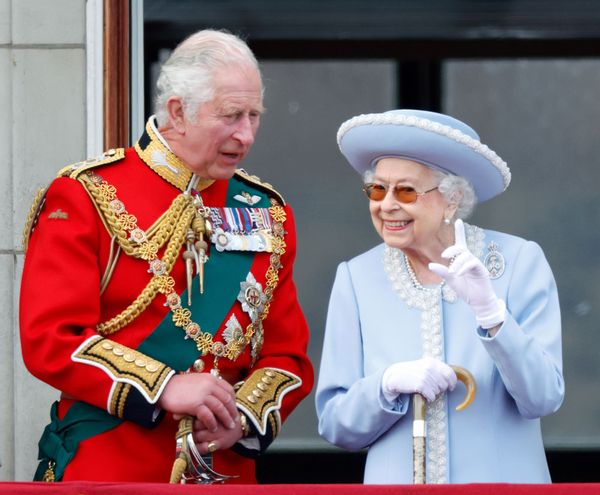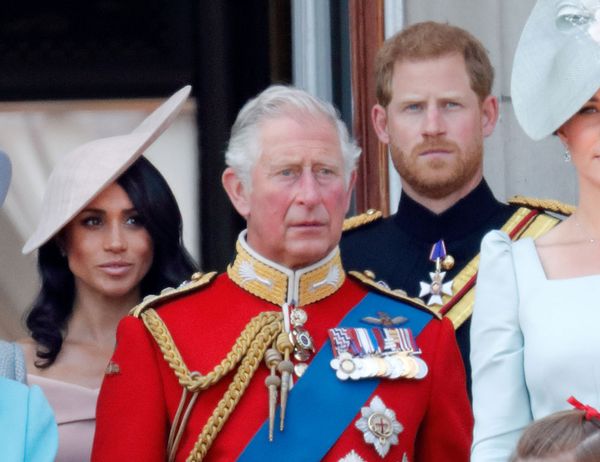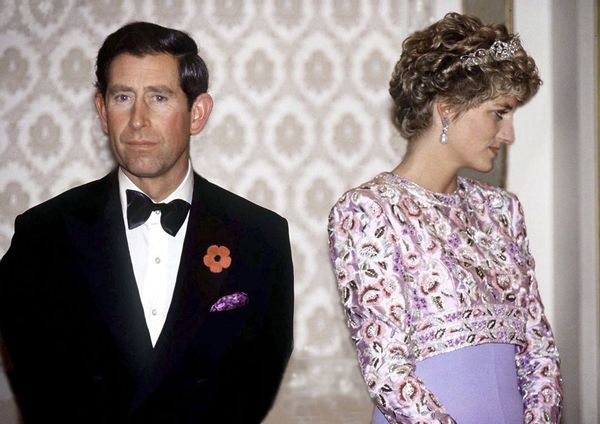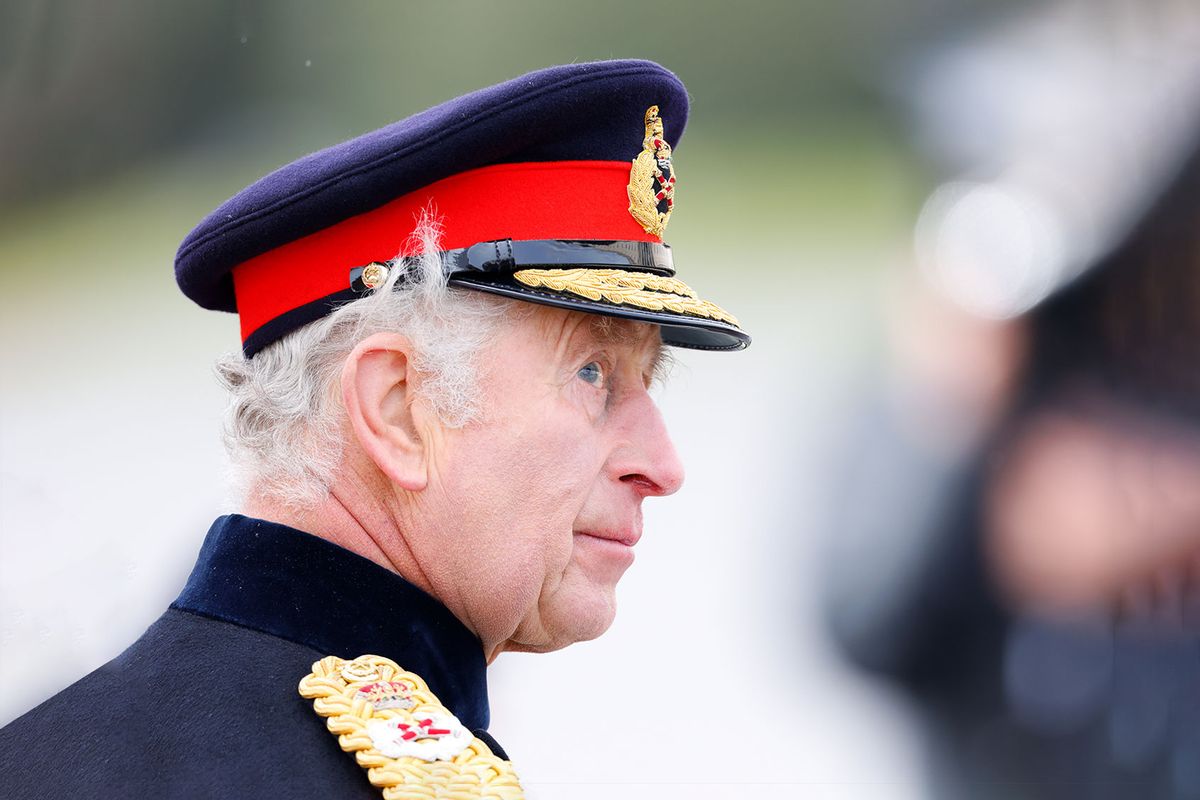It is in many ways a relatable, vulnerable moment. It's five days after the man's mother has died, and he's trying to hold it together, to perform one simple task. But is unsure of the date, and now the leaky pen in his hand is getting the better of him. "Oh God, I hate this," he mutters. But this is not some ordinary senior citizen grieving a parent. This is the new King of England. So the incident goes viral, a mishap that makes the man look like a petulant blunderer.
It's also the moment that opens the National Geographic documentary, "Charles: In His Own Words." It's the kind of Charles we've seen before, the inflexible grump of Prince Harry's "Spare," the icy antagonist of the Diana arc of "The Crown." But there's more to the new monarch than meets the eye. Through rare footage and archival interviews we get a picture of how the man has seen himself over the years — as a boisterous amateur actor, an involved and caring single dad, a vocal supporter of environmental issues and a husband who knows exactly "whatever love is." As director Tom Jennings told me during a recent "Salon Talks" conversation, "I think he plays a very long game, especially with the media, especially with his own family. He's looking way over the horizon when we're looking at the ground right in front of us."
Watch the "Salon Talks" episode with Tom Jennings to hear Jennings share what he learned from culling nearly 75 years of footage from one of the most publicly lived lives in history, about the bullying he endured as a child, future of the monarchy and the almost supernaturally patient way he's preparing for this moment his whole life — defective writing instruments be damned. "I didn't make this film to make people like him," Jennings said. But after making the film, he admits, "I have more respect for him."
"Charles: In His Own Words" is airing now on National Geographic, Hulu and Disney+.
This conversation has been lightly edited and for clarity and length.
Of all the moments in the 74-year-old Charles' life, you started with the pen. Why?
The leaky pen. Well, the way this film came about is that National Geographic wanted to do something on Charles. We had done "Diana: In Her Own Words," and that was very successful for them. We have a particular style in these films, which is there's no narrator and there are no modern interviews. Instead, for "Diana," we were very fortunate to convince Andrew Morton, the British author who wrote the famous book about Diana to let us use for the first time the tapes that Diana had made that were the foundation for his book. The rest is history on that one. It was quite extraordinary.
"Charles is playing three-level chess when the rest of us are playing checkers, despite being portrayed as hapless or befuddled."
When the queen passed, Charles technically becomes king, and we started talking with National Geographic like maybe we should consider doing something on Charles. They weren't quite sure what to do. Everything was up in the air, and eventually they decided that they would want to do something in terms of "in their own words" in the style that we do. So we came up with the idea of doing themes, and we developed maybe a dozen themes that we could look at in his life. The main theme that came to the fore as we looked at more and more footage was his relationship with the press and the press' relationship with him.
One thing we wanted to do was also make it feel current or contemporary. In the film, there is a series of modern events or current events that allow us to spring back in time to examine the themes that we're talking about. The first one is his relationship with the press, so we chose the leaky pen, which went viral and he was ridiculed as "unfit to be king" because he loses it over a leaky pen. We chose that on purpose, because who has not experienced a leaky pen in their pocket? It wasn't his pocket, but it had leaked all over the place. The fact that something that we could all relate to, a leaky pen, became headline news and questioned his ability to do his job was a good current example of how everything he does is not only watched, but then magnified by a thousand. There were other things we could have chosen, but that is well known. It also is such a great way to show that nothing escapes the eyes of the world when it comes to King Charles.
It also gives us the Charles that a lot of us think we know, which is that kind of guy who seems unprepared and has been sheltered his whole life. Yet later on in this same documentary, we see him at a public event where someone fires and charges at him, and he is cool as a cucumber.
Yes, and that was another example of his relationship with the press. I had forgotten that, if I even knew it at all, that someone had taken a shot at him, albeit with a starter pistol. It was in 1994 in Australia where he was celebrating Australia Day with the people there. He did not flinch, but it's fascinating to watch. It's something that most people probably have forgotten about because it was there and then it was gone.
He did a radio interview in Australia right after that where the reporter says, "Well, the reports are coming back from London, how he did not flinch under pressure, under the pressure of a firearm, has improved his image." And he goes off on this reporter about, "Why do you have to say something like this, 'It improves my image'? If you live in the public eye, sometimes these things happen." He just berates this reporter for feeding the 24/7 news cycle, which was not as intense as it is here today. It showed that he was well aware of how much scrutiny the press was giving to him all of the time.
"The fallout from the breakup with Diana, who was so popular, it's understandable how his approval rating would go down."
Something like this, instead of talking about how it was tragic that this person had such mental illness that he wanted to attack him, or talking about his own personal security, what did the press want to talk about? How being shot at and that he didn't flinch improved his image. It's just such a bizarre thing to say to someone who's just gone through a relatively traumatic experience like that. We chose it on its face because it's fascinating, it's forgotten. We have a lot of footage from Australia that people had not seen regarding that event. And then the reporter asks him something completely unrelated to it. He asks him about improving his image by being shot at. That's another reason why that one is in there.
 Prince Charles, Prince of Wales (wearing the uniform of Colonel of the Welsh Guards) and Queen Elizabeth II watch a flypast from the balcony of Buckingham Palace during Trooping the Colour on June 2, 2022 in London, England. (Max Mumby/Indigo/Getty Images
Prince Charles, Prince of Wales (wearing the uniform of Colonel of the Welsh Guards) and Queen Elizabeth II watch a flypast from the balcony of Buckingham Palace during Trooping the Colour on June 2, 2022 in London, England. (Max Mumby/Indigo/Getty Images
There is also this understanding in the UK that there is a relationship between the press and Buckingham Palace as well. What did you discover about that in your research?
About the back channels and relationships with the press, much like Diana, I think Charles is hyper aware that the press is always watching. He's also hyper aware that the press can be used to his advantage. I don't think he's quite as obvious about it as Diana was, but there's a lot more there going on on so many levels. It's really the mystery inside the enigma type of thing. I joke that Charles is playing three-level chess when the rest of us are playing checkers, despite being portrayed as hapless or befuddled. And he may be at certain times, we all are. I think he plays a very long game where things are concerned, especially with the media, especially with his own family. He's looking way over the horizon when we're looking at the ground right in front of us, so I'll give him credit. I have more respect for him.
I didn't make this film to make people like him, but to present him in a way that I don't think most people are aware of his circumstance and background and what has led him to today. His relationship with Harry, that's a film all by itself obviously, and there's been a lot that's been said of late. We included his relationships with his sons in the film, but we also juxtaposed it with his relationship with his own father and how he was a great disappointment to Prince Philip. Philip had sent him to a boarding school in Scotland called Gordonstoun, where Charles was mercilessly bullied by classmates and put upon, beat up in some cases. Yet that didn't make him enough of a man for Prince Philip, who was into Charles being a man's man type of guy.
So he sends him down to Australia to a place called Timbertop, and it's interesting, again to juxtapose it with Harry. Philip had said at the time, "I'm going to put some steel into him, or I just give up." You're 15 or 16, that's like a really rough thing to hear from your own father. And your mother is completely distant because she's the Queen of England.
I don't know that he had role models to go off of. He was nurtured by a guy named Lord Mountbatten, close friend of the family. [Mountbatten and three other people were killed by the IRA in 1979.] To see where he came from, then we show footage of him when the boys are young, playing and roughhousing together. And you look and you think, how sad compared to where things stand today.
What's going on in the headlines with Harry and his relationship, that's barely scratching the surface. I think there's a lot more going on behind the scenes. Again, my opinion is that as part of Charles's long game, whatever that may be in regards to his sons, there's a lot more bubbling underneath of which we're not aware.
As this documentary points out, even Diana admired Charles as a father.
"What's going on in the headlines with Harry and his relationship, that's barely scratching the surface. I think there's a lot more going on behind the scenes."
Thank you for picking up on that. Yes. We contacted many book authors who've written about Charles over the years, and one of them had a clip from, I believe a member of Parliament. You hear from that person as Diana's funeral is playing out in our film. Diana had mentioned to this member of Parliament how good a father she thought Charles was. The author writing the book asks, "Well, when did she say that?" And the member of Parliament responds, "About six months before she died." So again, there's all this vitriol that goes around regarding Diana's last few months on the planet and her relationship with Charles, yet behind the scenes she had mentioned that she thought Charles was a good father to her sons.
Meghan in so many ways encapsulates this feeling about the monarchy that things have got to change. How has she changed Charles? Has she made him dig his heels in more about this institution or has she helped him maybe think of a different way to move forward as a king?
I think just because of the publicity surrounding what Meghan and Harry have been doing the last couple of years, it's probably lit a fire under Charles in a sense, about having the monarchy evolve. My opinion is he knew that the monarchy had to evolve once his mother has passed. And by the way, what a strange thing for you to get the dream job, the job of anyone's lifetime, the King of England, but you have to wait for your mother to die in order to get it.
 Meghan, Duchess of Sussex, Prince Charles, Prince of Wales and Prince Harry, Duke of Sussex stand on the balcony of Buckingham Palace during Trooping The Colour 2018 on June 9, 2018 in London, England. (Max Mumby/Indigo/Getty Images
Meghan, Duchess of Sussex, Prince Charles, Prince of Wales and Prince Harry, Duke of Sussex stand on the balcony of Buckingham Palace during Trooping The Colour 2018 on June 9, 2018 in London, England. (Max Mumby/Indigo/Getty Images
It's a bit of an odd thing. I lost my mom when I was very young, younger than Harry actually, and it's not something that really ever goes away. I think that he's always harbored some rage and resentment about anyone and anything having to do with how Diana passed, which would include his father and Camilla. I think his relationship with Meghan has allowed him to express that in a way that perhaps he wouldn't have done before.
"[Harry] has always harbored some rage and resentment about anyone and anything having to do with how Diana passed, which would include his father and Camilla."
However, I also think Charles probably realized sometime in the last few years that his reign was going to be relatively short compared to his mother's. After studying him, I think he sees himself as the hinge person between the old and the new, which will be William. He is the conduit through which whatever vestiges of the old monarchy they'd like to keep around. Certainly the traditions, the things that tourists love, stay connected to the past. But I think going forward, he talks about a slimmed-down monarchy, one that's less bulky. Maybe there's going to be a bunch of layoffs. I'm not quite sure how it's going to play out. I think he knew that had to happen even before Meghan and Harry started doing their tour on what's wrong with the royal family, and so he's perhaps going to speed that up.
He's greatly constrained as the Monarch about being involved in politics. For example, we talk about that he can't comment on things like global warming anymore. For the first time in years because he's now King, he was not allowed to give a speech at the UN Climate Summit, not by his choice, not by the UN's choice, but the way the monarchy is currently structured. I think the slimmed-down version, the physicality of that will be evident, but over the next couple of years, you are going to see Charles take it in a direction where either he or his son, when he becomes king, will be able to stand on the floor of parliament and talk about global warming.
I see it becoming more political in that sense, and I think that's where he always wanted it to be. Whether he is successful or not, I don't know. And I think the relationship with Meghan and holding "the firm's" feet to the fire, if it's done anything, it's probably accelerated the process in his own mind about how quickly that needs to be done.
We know how unpopular the monarchy is and that the majority of his subjects don't approve of the monarchy. Yet Charles still has a much higher approval rating than he did 30 years ago, when it was 4%.
I mean, who gets 4% from approval ratings?
That was shocking, when we dug up that. Our researchers who worked so very hard on it, I made them check it three times. I said, "Get another source." I was a journalist when I first graduated from college, and there's the old adage that if your mother says she loves you, get a second source. So I said, "You get three sources on that to make sure it's right."
He's still very popular. He is popular now. The fallout from the breakup with Diana, who was so popular, it's understandable how his approval rating would go down. But down to 4%, that's almost something you cannot recover from. He plays the long game. He has recovered from it.
One thing I did not know is that he and Camilla dated when they were single in 1970. The fact that they were dating and that because they did what young people do when they're in love, they had an intimate relationship, disqualified her from marrying Charles, becoming queen. That was in 1970. Well, 53 years later, Charles is going to become king. He's married to Camilla, and she's going to be queen. That's an example of his long game to me. I mean, it took 53 years for all of that to come to pass, but he kept going.
He's getting every piece of the pie.
Everything he ever wanted.
You spend a good amount of time on probably the most famous few words Charles has ever said in his life. "Whatever love means."
Whatever love means. Yes.
It's the last thing you want your fiancé to say about love. And yet, this is a man who has had a 50-plus year love affair with one particular woman. He does know what love means. He is married to, as is pointed out in this documentary, his soulmate. He knows what love means, right?
"You're going to start to see changes soon. They will be subtle and subtle and subtle."
He does know what love means, and he was well aware, I believe, when he uttered those words, "whatever love means." You could really extrapolate that out to be, well, this is love under the current constraints in which I live.
It was a heinous thing to say, and I liked how our editors used every frame of the cameras continuing to roll. That clip is shown a lot, but it's often cut off after you see Diana say, "Yeah, thank you very much," because the reporter has to explain what love means. They both kind of say, "Thank you. Thank you." She looks down, but most people don't realize how long the camera stayed on Diana. The look down continues, and you just see this expression of despair and horror, I think would be a good way to describe it. She's completely defeated in that moment.
 Prince Charles And Princess Diana On Their Last Official Trip Together - A Visit To The Republic Of Korea (South Korea). (Tim Graham Photo Library via Getty Images)That look is also on Charles's face as well. When I saw that clip, I saw the despair on his face as well. I saw two people looking away from each other in abject despair.
Prince Charles And Princess Diana On Their Last Official Trip Together - A Visit To The Republic Of Korea (South Korea). (Tim Graham Photo Library via Getty Images)That look is also on Charles's face as well. When I saw that clip, I saw the despair on his face as well. I saw two people looking away from each other in abject despair.
I agree. Both of them. It's much easier to follow Diana's gaze because she described herself as "the lamb to the slaughter," and it was obvious that was what was going on. It was part of how the institution worked. It was what they needed, and she was the person in line, available to do that. "Whatever love means," I think will be something that will haunt him forever in many ways.
"At 19, that's where his passion for environmental issues was ignited."
You mentioned the anti-monarchists. There's a tremendous anti-monarchist movement because people are thinking, "What do we really need him for? We don't live in a fiefdom anymore. It's not a role to till the soil and then present the king with our best sheep. It just doesn't work that way." He's well aware of that too. I think that's why you're going to start to see changes soon. They will be subtle and subtle and subtle. Then you and I will talk in five years and we'll say, "Wow, look what he pulled off right under our noses, little by little."
One of the ways that we got into that was showing the anti-monarchists who were protesting after the Queen. There were people who believed once Elizabeth died, that was going to be it; Charles would say, "Why don't we just let this fade into the sunset?" He has no intention of doing that.
However, when he was 19 and went through this process called the investiture to become Prince of Wales, he walked right into these riotous crowds up in Wales and charmed them, which is a remarkable thing at 19. I wasn't calming riotous crowds when I was 19 years old. I could barely get to my class in college on time. Not only does he do that, but then he goes on this tour. He first learns the language. He spends two months in a university up there learning the history of the place. He tours Wales. I love that where he interviews an old farmer in Wales. That's very rare stuff, and we loved having it. Then he goes on this grand tour of Wales where he is meeting people, and he meets a bunch of young people who are out planting trees, and they're talking about the environment.
At 19, that's where his passion for environmental issues was ignited. In Wales. Here we are all these years later, and it's probably his number one issue outside of family problems. It's his number one global issue about climate change and global warming. That started at 19, and it's part of his long game of doing things. I think we're going to see more and more of that play out.
Watch more
"Salon Talks" about the royals



Shares